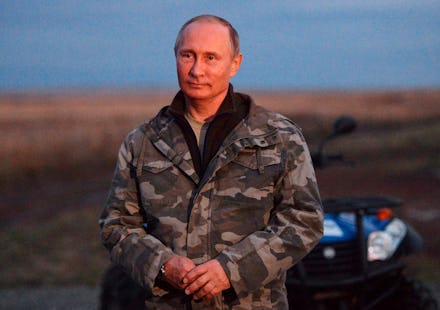Is Vladimir Putin a dictator? Here’s what experts have to say.

As relations between the U.S. and Russia approaches its lowest point in decades, Western eyes are training themselves with increasing curiosity on the imposing figure sitting at the helm of the Russia's political machine: President Vladimir Putin.
Putin has made waves lately, and not just for his hot-button bromance with Republican presidential candidate Donald Trump.
In the past four years alone, Russia has ramped up airstrikes over Syria in its attempt to defeat Syrian opposition fighters, attempted to annex the Crimean peninsula of Ukraine and announced it will suspend an agreement with the U.S. to dispose of its store of weapons-grade plutonium.
Such actions have led some to question the nature of the Russian president's level of authority: Is Putin a democratically-elected leader who rules with a firm hand — or is he a dictator?
For Stephen Crowley, a professor of politics at Oberlin College, the answer lies somewhere in the middle.
"Most political scientists that I'm aware of would say that Russia is in between a democracy and an outright dictatorship, what some would call a 'hybrid regime' or 'electoral authoritarianism,' though Putin has certainly been drifting more toward [the] authoritarian side," Crowley said in an email.
A dictator, as it is typically defined, is a ruler with absolute power over a region, power which has oftentimes been obtained by force. Putin, Crowley says, meets this criteria in a number of ways, including the ways he has safeguarded his hold on Russia's top political office and ruled largely through executive authority.
But Crowley cautions against comparing the Russian president to other dictators, like North Korea's Kim Jong-Un or Syria's Bashar al-Assad, because Russia still has "contested elections, opposition parties, and at least some degree of freedom of speech."
Joshua First, a professor of Russian and Ukrainian history at the University of Mississippi, echoed Crowley's point about Russia's contested elections lending a degree of credibility to their democratic nature, but cautioned that the country's elections are still not "fair" in the way we would understand them.
"The process is greatly manipulated, the most vocal opposition is suppressed, fraudulent votes are added in favor of the pro-government party, and so on," First said over email. "But elections still matter, they have helped to give the regime legitimacy."
First also noted that Putin's overwhelming popularity — 80% approval, according to a Bloomberg report from May 2016 — further complicates things.
"While a good bit of this can be explained by state control over media, and sidelining the opposition, were truly free elections [held tomorrow], he would still win," First said. "Many people are fed up with corruption, economic conditions, and a number of government policies, but they still support Putin."
So, although many Western politicians are quick to slap the label of "dictator" on Putin in the midst of one of his inflammatory political maneuvers, the reality is that the Russian president's deft navigation of muddy political waters has enabled him to avoid the designation — for now — in any official capacity.